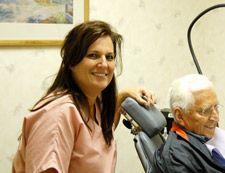Dental care and the elderly
Senior Mobile Dental is a non-profit organization focused on bringing dental hygiene services to the elderly population of the Colorado Springs area. Photo: Courtesy of Senior Mobile Dental

Senior Mobile Dental is a non-profit organization focused on bringing dental hygiene services to the elderly population of the Colorado Springs area.
Photo: Courtesy of Senior Mobile Dental
In 2000, the Surgeon General reported on Oral Health in America, finding that ‘there are profound and consequential oral health disparities within the U.S. population’.
For years now, the elderly community has slowly become an invisible population; their position in the dental industry is no different. It’s no secret that the majority of dental care providers are family practices and most public support programs are focused on children ages 18 and under. So how has a majority of our population failed to receive proper dental care?
One of the most common concerns the elderly population has about receiving proper dental care is cost. According to MEPS, in 2000 people ages 65 and older paid more than three-quarters of their dental expenses out of pocket. Since most of the elderly receive Medicaid or financial support from family members, the near 3,000 dollar cost for dentures can seem overwhelming.
Still, dentures are a seemingly easy fix compared to abstractions extractions and restorative procedures which are significantly more expensive. “Most of these people are on a fixed income, so their dental care is put off,” registered dental hygienist and founder of Senior Mobile Dental, Michelle Vacha said.
“There is some kind of barrier, and I’m not sure what it is. Maybe these people are afraid knowing if they go to the dentist they will find something wrong, and they’ll be hit with heavy costs in order to fix the problem,” Vacha said.
While cost may be the root of the problem, it isn’t the only issue for the elderly. Access to care is just as troublesome. The elderly are also frailer; transporting to a dental office can be very traumatic. Loss of dexterity, makes it difficult to impossible to brush their teeth themselves. And while many of the elderly live in assisted living and skilled nursing facilities, little instruction is given to CNA’s for proper oral hygiene. Elders also face decreased salivary flow leaving them with heavy plaque and materia alba buildup, which Vacha compares to “velcro on their teeth.”
Everyone has their embarrassing moments they’d be only too happy to forget. Vacha says as she recounts one of her first experiences with an elderly patient. Incontinence is a major issue they face while transporting out of homes.
“I had an elderly woman that was dropped off for a dental appointment; while I was with another patient she went to use the restroom," Vacha said. "When I finished with my patient and I walked to the front office, staff was standing around the bathroom. The woman needed help and she sat there for over half an hour and no one went to see if she needed help.”
Once they make it to a dental office, often times the elderly will find that the facility does not cater to their needs beyond the chair.
“The general public is not used to providing them with the help they need,” Vacha said. "And in truth, it can be uncomfortable for the clinician and patient; yet another reason a lot of elderly people opt out of going to the dentist. The dental industry needs to find a way to help the elderly community with their dental needs, while allowing them to keep their dignity intact."
Still, the biggest hurdle the elderly need to overcome is cost. A typical checkup can run anywhere from 250 to 300 dollars. Not to mention the cost of dentures, fillings, restorations and extractions. Medicaid and Medicare and public support in funding need to be reassessed, in order to help this community receive the dental care they need. Very little options are available for preventive oral health care.
“We need to start addressing these issues now before it really hits us,” Vacha said. "Poor oral health relates to all kinds of health issues ie, the oral/systemic relationship which could be avoided by getting the proper dental care. Dental care is important to us all, overlooking a generation that is seemingly ‘invisible’ will cause an epidemic, and with that will come health issues and crisis across the board."
Vacha’s main observation: “If this population still has their teeth at this stage of their life, it shows they have taken care of their teeth their whole life. Why should their standards of care change now due to retirement and loss of dental insurance, loss of dexterity or loss of their ability to transport to a dental office? This is why I founded Senior Mobile Dental; to address the issues older adults face in access to care and their financial barriers.”
Join the Discussion
- Comment on this and other articles on our Facebook page
Related Articles
- Handling the patient complaint
- Helping those who really need it
Oral Health Pavilion at HLTH 2024 Highlighted Links Between Dental and General Health
November 4th 2024At HLTH 2024, CareQuest, Colgate-Palmolive, Henry Schein, and PDS Health launched an Oral Health Pavilion to showcase how integrating oral and general health can improve patient outcomes and reduce costs.
Episode 31: Dentsply Sirona Implant Announcements
September 30th 2021DPR’s Editorial Director Noah Levine sat down with Gene Dorff, Dentsply Sirona’s group vice president of implants and Dr. Dan Butterman to review several big announcements the company made in the arena of implants during Dentsply Sirona World 2021 in Las Vegas.